- Home
- Chris Ryan
Battleground cr-6 Page 2
Battleground cr-6 Read online
Page 2
‘All right,’ Ben said, quiet but secretly grateful. Miss Messenger obviously knew how worried he was about his mum.
The seats were scorching hot. Bel sat in the middle and Ben by the passenger window. It took a couple of goes for Carl to start the engine, but they were soon off, driving out of the car park and onto a busy main road. Behind them, everyone was chatting excitedly, but up front they sat in silence.
They passed cars, motorbikes and the occasional rickshaw. There were fruit stalls along the side of the road, and children playing. There were also, Ben couldn’t help noticing, a lot of policemen armed with rifles.
The air was hot, dry and dusty and he was already sweating. He rolled the window down, but it didn’t make much difference.
‘Busy around the city,’ Carl explained in a loud voice. When it was clear that nobody in the back was listening to him, he continued to address only Ben and Bel. ‘But it’ll quieten down as we head west.’ As he drove, he grabbed a clipboard that was resting on the dashboard. ‘Ben…’ he murmured, one eye on the clipboard and one on the road. ‘Ben Tracey?’
‘That’s right,’ Bel answered for him. Ben hated it when she did that.
‘We’ve put you with a lovely family. Just three of them — mother, father and daughter. Quite western in the way they live their lives.’ He smiled. ‘Shouldn’t be too much of a culture shock for you.’
Ben thought of telling him that shocks were the one thing he was used to, but he didn’t. They drove in silence.
‘Been to Pakistan before, Ben?’ Carl ventured after a while. ‘Know much about it?’
‘A bit,’ Ben murmured, but before he could say any more, Carl was gabbling away again.
‘Beautiful country. Beautiful. But poor, in places. You shouldn’t expect luxuries where you’re going, Ben. The people there live hand to mouth. Good people, Ben. Good people. A few rotten apples, but you get the same anywhere, don’t you.’ As he spoke, he cast a sidelong glance at Ben. ‘You’re staying with a lovely family, Ben. A lovely family. They don’t have much, but are happy to share what they have. And they’re looking forward to seeing you, Ben. Really looking forward to seeing you.’
They passed a bus. It was multicoloured and packed as tightly as a tin of sardines. Then more policemen, four or five of them on a street corner, all armed. Ben couldn’t help staring at them.
‘You’re aware of the security situation in this part of the world, I suppose.’ Carl looked in the rear-view mirror as he spoke.
Bel shot him a quick look. ‘We’ve been led to understand that Kampur is relatively peaceful.’
‘Oh, of course,’ Carl said quickly. ‘Of course, of course. Lovely people. Lovely people. Ignore the rumours.’
‘What rumours?’ Ben demanded.
‘Nothing. Nothing. But you know how people will talk. Village gossip, nothing more.’
‘What rumours?’
‘Nothing. Really, nothing. This is going to be a great experience for you, Ben. A grand experience.’
Ben didn’t feel particularly reassured and Carl seemed to sense that. ‘Honestly,’ he said, ‘it’s true that there are other places in the region — to the north and south and closer to the Afghan border — where I would not recommend you to go. But Kampur is a safe place. Safe as houses. We wouldn’t let a group of school kids stay there otherwise — can you imagine the sort of publicity the charity would get if something went wrong?’ He smiled — a broad, almost cheeky grin. ‘And after all, it’s not exactly Helmand Province.’
Ben felt a twisting in his stomach. He looked at his mum, but Bel was staring firmly at the road ahead. Carl seemed to realize he’d said something wrong. He opened his mouth, thought better of it and clamped it shut again.
They continued to drive on in silence.
Chapter Two
SAS Headquarters, Hereford, UK.
There were four of them in the unit. Ricki was the leader, but Toby, Matt and Jack were equally skilled. They had all been in the SAS for five years and they worked together like cogs in a watch, each man practically knowing what the other was thinking.
They sat in the briefing room. No windows, no pictures on the wall. Just an overhead projector beaming a map of southern Afghanistan onto a whiteboard and the ops sergeant standing next to it, giving them their instructions. He was a tall, thin man with hollow cheeks and a scar across his forehead. He didn’t look like someone you’d want to mess with; but then again, nor did any of them.
‘Here’s your schedule,’ he announced. ‘Leave here tomorrow at oh-six-hundred hours. Regular green army flight from Brize Norton to Kandahar, arrival twelvehundred hours. Overnight at Kandahar, then on to Camp Bastion the following morning. You’ll be inserted into the town of Sangin by Chinook under cover of dark.’
He turned to the map and pointed out Sangin. It lay right on the Helmand River in the northern part of Helmand Province. He didn’t really need to point it out to the unit. They’d been on ops in this part of the world so many times that they knew the geography well.
‘Good old Sangin,’ Ricki said. ‘Sometimes I think I should buy a house there. It seems to be where I spend all my time.’
‘Last time I looked,’ Matt rumbled, ‘all the houses had been flattened. I’d stick with Hereford if I were you.’
‘Yeah,’ Ricki replied with a wink. ‘Good point.’
‘All right,’ the ops sergeant interrupted their banter, ‘listen up. As you know, we’ve got intelligence guys on the ground in Helmand. They’re all reporting the same thing. The Taliban in the area are preparing something big. It could be anything. All we know is it’s hush-hush. They won’t refer to it on their radio transmissions, and the low-level Taliban recruits we’ve managed to capture know nothing about it. Whatever it is, the commanders are keeping it to themselves.’
‘Let me guess,’ Matt piped up. ‘That’s where we come in.’
The ops sergeant nodded. ‘The American special forces are spread thin on the ground. We’re sending you in to help gather information. You need to get as close to the Taliban commanders as you can. By whatever means necessary, gentlemen. Whatever it is the enemy have got planned, they’re excited about it. That’s enough to make our own commanders very nervous indeed. As things stand, we’ve got the enemy on the back foot. If they manage to do anything to upset that, it would be a disaster for the war effort and for the people of Afghanistan.’
He looked at them all with a serious expression, and this time there were no jokey comments.
‘All right, gentlemen. You’ll receive more instructions when you’re in country. You can check out your weapons and spend the rest of the day putting your packs together. RV back here at oh-five-hundred tomorrow.’
The four men in the unit nodded, then stood up, left the briefing room and went to make their preparations.
The minibus of exchange students hadn’t driven far before the outskirts of Quetta started to melt away and the scenery changed dramatically. As Carl had promised, the road was bad — stony and bumpy. It took them alongside a vast lake, in the middle of which was a small island only ten or twenty metres wide. Perched in the centre of that island was some kind of shrine. It looked ancient and very beautiful. And in the distance, the ever-present mountains. Even though the van rumbled and chugged, there was a sense of peace about this place. The others in the back seemed to notice it too. They were quiet and a few of them had even nodded off.
‘I’ve heard that some of the Taliban in Afghanistan come over the border from Pakistan,’ Ben said suddenly. ‘Is that true? And are the Taliban really that dangerous?’ The question had been rather on his mind.
Carl glanced at him as he drove. ‘There’s Taliban,’ he said, ‘and then there’s Taliban.’
‘What’s that supposed to mean?’
‘Ben,’ his mum admonished.
‘It’s OK,’ Carl said. ‘It’s an important question.’ He paused for thought before speaking again. ‘Have you heard of the Ku Klux Klan, Ben?�
��
He nodded. ‘Yeah.’
‘Well, the Taliban are to Muslims what the Ku Klux Klan are to Christians — a horrible perversion of the way things are supposed to be. Islam is a very peaceful religion, but the Taliban give it a bad name. They used to be in charge of Afghanistan and they were very brutal, especially to women. They were deposed in two thousand and one by the British and Americans because they allowed the terrorist leader Osama bin Laden to hide in Afghanistan after nine/eleven. There are still some Taliban who want to take back the country. Most of them are very vicious fighters who don’t mind if they die, because they think they are fighting a holy war.’
Ben glanced at his mum, who was looking straight ahead.
‘You said “most of them”…’
‘That’s right, Ben.’ Carl nodded. ‘You see, some people join the Taliban for other reasons. Because they don’t like the government; because they’re poor; because they’re misguided. They’re not radical or evil. It’s just possible, Ben, that you will hear people claim to be Taliban sympathizers. Avoid them, but don’t fall into the trap of assuming that they’re all bad. They’re not. They’re just poor. The Taliban commanders take advantage of them. But not in Kampur, Ben. These things are very localized.’
They passed an old man by the side of the road. He wore ragged robes and carried a staff which he was using to direct two rather thin-looking sheep. The old man stared at them as they passed. His face was leathery and wrinkled, his eyes piercing.
‘What about the ones in Helmand Province?’ Ben asked. ‘Are they all bad?’
‘Stop asking Carl so many questions, Ben,’ his mum said a bit peevishly.
Ben opened his mouth to argue, but one look from her told him that probably wasn’t a good idea. He shut it again and went back to looking out of the window and watching the strange, unfamiliar, beautiful landscape slip slowly past.
The day was almost done by the time they trundled into Kampur. Ben was sweaty, dirty and tired from the long journey.
It was called a village, but to Ben’s eyes it was bigger than that. A small town, ramshackle and sprawling. Some of the buildings were made of brick, others of mud baked hard by the fierce sun. The grander places had tiles on the roofs, but most of the dwellings were covered with sheets of corrugated iron. They reminded Ben of the huts he had seen in the Democratic Republic of the Congo, and were none the more welcoming for that.
Even though the sun was sinking in the sky, there were still food stalls by the side of the road and plenty of children playing in the dusty streets. As Carl drove the minibus slowly through the town, the vehicle attracted a lot of attention from these kids. Some of them waved; others chased along behind. Ben thought he knew why: it wasn’t much of a vehicle, but it was a lot classier than the few rusty, beaten-up cars he saw parked around the place.
‘Here we are,’ Carl announced suddenly with a smile. They came to a halt.
It was a subdued group that dismounted from the bus. Ben sensed that everyone was feeling a bit nervous. He certainly felt like they were a million miles from home. It was good to stretch his legs, though, and he did a couple of circuits of the minibus before looking around properly. They had parked on the edge of a square. Surrounding it were what Ben could only describe as shacks — rickety stalls with iron grilles in front of them. He supposed they were shops, but they were closed at the moment.
In the middle of the square was a large group of people — young and old. They watched the new arrivals expectantly. Mr Knight and Mr Sawyer, who knew Kampur from exchange programmes in previous years, saw a couple of faces they recognized and strode towards them, smiling and with hands outstretched.
‘Come on, everyone,’ Carl boomed, clipboard in hand. ‘I’ll introduce you to your families. There’ll be some group activities organized later in the week — spectacular countryside nearby, spectacular — but for now it’s important that you get to know your exchange partners and settle into your families. Come along! Don’t be shy!’
Ben and the rest of them followed. There was a moment of awkwardness as the two groups refused to mingle, but as Carl started reading off names and introducing Ben’s school mates to their new families, the awkwardness disappeared. For all of them, that is, except Ed, who looked at the small Pakistani boy who was to be his exchange partner with his usual sneer. Ben wondered why he had even wanted to come in the first place.
‘Ben Tracey? Ah, Ben. Come with me and meet Saleem and Harata.’ A man and a woman approached. Their clothes were western in style, but old; they each had a big smile on their face as they shook Ben’s hand. ‘And this,’ Carl continued, ‘is Aarya.’
Aarya was standing quietly behind her parents. She had long, shining black hair, clear brown skin and deep-brown eyes. She looked shyly at the ground.
Ben held out his hand. ‘Hi,’ he said. ‘I’m Ben.’ Her fingers felt very small in his.
And then his mum was there, introducing herself. Before he knew it they had picked up their bags and were walking away from the square: Saleem, Bel and Harata chatting freely, Ben and Aarya in silence.
They had only been walking a couple of minutes before they stopped by a low wall in which there was a wooden gate. Behind it there was a compound, the walls built from pale, sandy bricks. In the front was a courtyard with two fruit trees — Ben couldn’t tell what kind. And beyond the fruit trees was a simple, red-painted door which glowed in the reflection of the setting sun. It did not look especially lavish, but it wasn’t the poorest place Ben had seen since arriving in Kampur.
‘Allahu Akbar,’ Saleem said. And then, in very good English, ‘Welcome to our home!’
He ushered them in. ‘You must be very hungry,’ he announced as they walked past the fruit trees. ‘Harata and Aarya have prepared food for you. Come in, come in!’
At the main entrance to the house, the family removed their shoes. Ben and Bel did the same before stepping inside. It was dark here, but cooler, which was a relief. They were led through an empty hallway into a room with a low round table no more than knee height. ‘Please,’ Saleem told them, ‘sit.’ And as if showing them what to do, he sat on the floor at the table. Ben and Bel copied him.
The three of them chatted politely about the journey while Aarya and her mother brought bowls of food to the table. Delicious smells filled the room and Ben realized he was ravenous. Still without looking him fully in the eye, Aarya handed him a plate of spiced lamb and a huge, warm flatbread. Ben looked around for some cutlery, but there was none and Saleem smiled at him. ‘We eat with our right hand, Ben,’ he said, before tearing off a piece of his bread and using it to scoop up the lamb. Ben did the same and crammed the food into his mouth. It was delicious.
‘We are sorry,’ Saleem said politely to Bel, ‘that you cannot stay with us longer than one night.’
Bel inclined her head. ‘My work…’ she explained between mouthfuls of food.
‘I understand that you are going to Afghanistan.’
She nodded.
Saleem’s face grew serious. ‘It is a troubled country,’ he said mildly.
‘I hope what I am going there to do will help to heal it,’ Bel replied. As she started to explain the reasons for her visit, Ben’s mind began to wander. He supposed he should be feeling nervous; but the family with whom he would be staying had been so welcoming that he almost felt at home. He looked at Aarya and smiled. For the first time, she smiled back.
His ears tuned in once more to what his mum was saying. ‘… and as the Taliban use money from the poppy trade to finance the war, it’s important that we do something to stamp it out.’
The Taliban. With those two words, a sense of unease returned to Ben’s stomach. He remembered everything Carl had said in the car, and he found himself wanting to know more.
‘Are there Taliban here?’ he asked.
There was a silence. Aarya and her mother bowed their heads and looked down at their food. Saleem cleared his throat uncomfortably. Somebody shouted out i
n the street, and for a moment it was the only sound. He blushed.
It was Saleem who broke the silence. ‘Aarya is looking forward to showing you her school tomorrow,’ he said. The girl’s head remained bowed. ‘We do not get many young people travelling to our village.’
Ben hardly heard him. His skin was still hot with embarrassment and his mind was ticking over. He had asked about the Taliban and the mood had changed. Now he had just one question in his head.
Why?
Chapter Three
Ben and his mother slept on rolled-up mattresses that had been unfurled on the hard floor of a plain room which contained nothing but a religious text on the wall in Arabic. They were woken just before sunrise by the call to prayer. As Ben drowsily sat up he listened to the lone voice of the muezzin — the mosque official — wailing into the early morning. A bit different from the annoying beep of his alarm clock back home, he thought. And then he saw that his mum was already packing her rucksack by the light of a torch. He watched her for a while before she realized he was awake.
Bel smiled at him. A sad smile. ‘I’m leaving at sunrise,’ she said. ‘I’ve got an army escort picking me up and then…’
‘You will be careful, won’t you, Mum?’
She sat on his mattress and ran her hand through his hair. ‘Course I will, love. Don’t worry. They’ll take good care of me. And Aarya and her family will take good care of you.’
He nodded.
‘I have to go,’ Bel said. ‘I’ll see you in two weeks, OK?’
‘OK, Mum,’ Ben said quietly. He kissed her, then continued to watch as Bel finished her packing and quietly left the room.
Ben suddenly felt very alone. He wished he could lose himself in sleep, but there was no way that was going to happen now. As the wailing of the call to prayer faded away, he hauled himself from his bed, got dressed and ventured out of the room. Aarya and her mother were already up. The small house smelled of fresh bread and the women were placing tea and small, sweet pastries on the table.

 Global Strike
Global Strike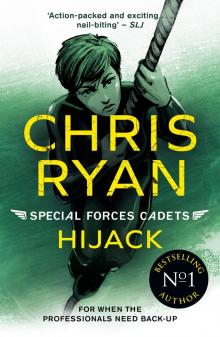 Hijack
Hijack Special Forces Cadets 2
Special Forces Cadets 2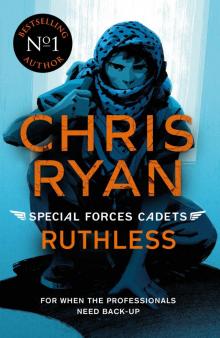 Ruthless
Ruthless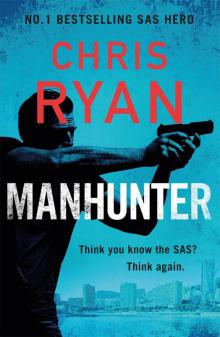 Manhunter
Manhunter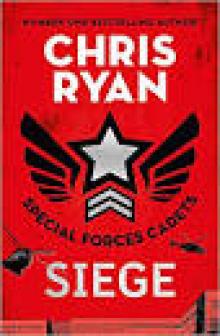 Special Forces Cadets 1
Special Forces Cadets 1 Red Strike
Red Strike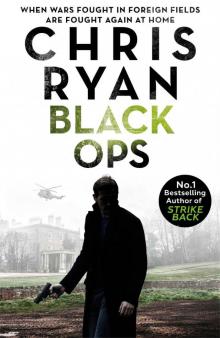 Black Ops
Black Ops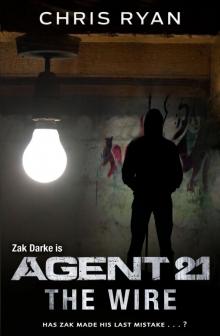 Agent 21: The Wire
Agent 21: The Wire Land of Fire
Land of Fire Alpha Force: Fault Line
Alpha Force: Fault Line Under Cover (Agent 21)
Under Cover (Agent 21) Endgame (Agent 21)
Endgame (Agent 21) Red Centre
Red Centre Blackout
Blackout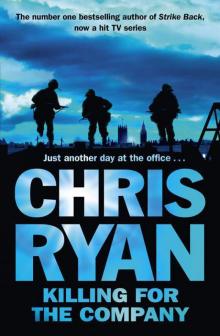 Killing for the Company
Killing for the Company The Watchman
The Watchman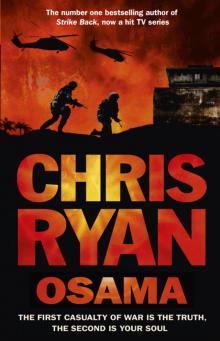 Osama
Osama Who Dares Wins
Who Dares Wins The Kremlin Device
The Kremlin Device Hunter Killer
Hunter Killer Alpha Force: Untouchable
Alpha Force: Untouchable Stand By Stand By
Stand By Stand By Chris Ryan Extreme: Hard Target: Mission Four: Fallout
Chris Ryan Extreme: Hard Target: Mission Four: Fallout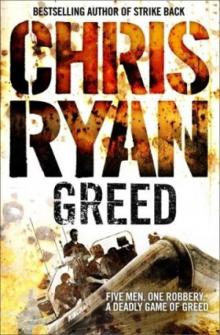 Greed mb-1
Greed mb-1 Alpha Force: Desert Pursuit
Alpha Force: Desert Pursuit Strike Back
Strike Back Greed
Greed The Bay Bulls Standoff
The Bay Bulls Standoff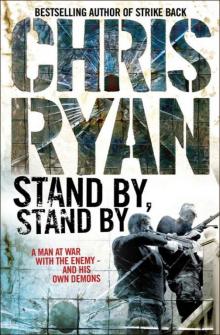 Stand By, Stand By gs-1
Stand By, Stand By gs-1 Outbreak
Outbreak Hunted
Hunted Vortex cr-4
Vortex cr-4 Rat-Catcher
Rat-Catcher Vortex
Vortex Bad Soldier
Bad Soldier Shadow Kill: A Strikeback Novel
Shadow Kill: A Strikeback Novel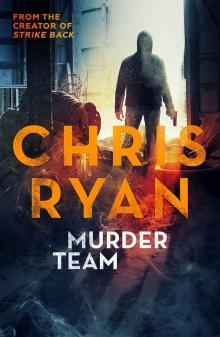 Murder Team (Kindle Single)
Murder Team (Kindle Single) One Good Turn
One Good Turn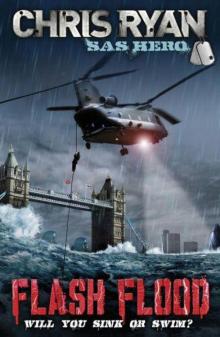 Flash Flood cr-1
Flash Flood cr-1 Night Strike
Night Strike Wildfire
Wildfire Agent 21: Reloaded: Book 2
Agent 21: Reloaded: Book 2 Chris Ryan Extreme: Hard Target: Mission Two: The Rock
Chris Ryan Extreme: Hard Target: Mission Two: The Rock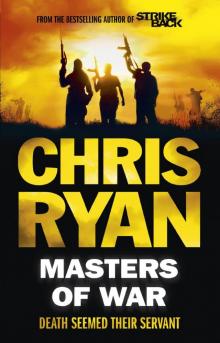 Masters of War
Masters of War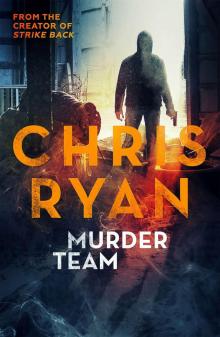 Murder Team
Murder Team War Dog
War Dog Wildfire cr-2
Wildfire cr-2 Survival
Survival The One That Got Away - Junior edition
The One That Got Away - Junior edition The Hit List
The Hit List The Kill Zone
The Kill Zone Medal of Honor
Medal of Honor Battleground
Battleground Twister
Twister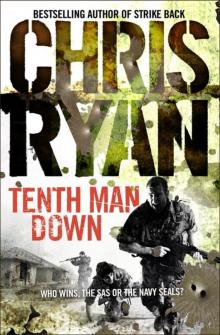 Tenth Man Down gs-4
Tenth Man Down gs-4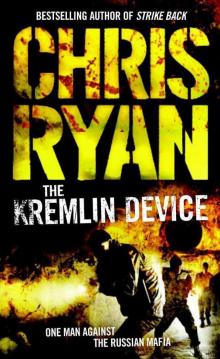 The Kremlin Device gs-3
The Kremlin Device gs-3 Hostage
Hostage Bad Soldier: Danny Black Thriller 4
Bad Soldier: Danny Black Thriller 4 Alpha Force: Blood Money
Alpha Force: Blood Money Firefight
Firefight Chris Ryan Extreme: Hard Target: Mission One: Redeemer
Chris Ryan Extreme: Hard Target: Mission One: Redeemer Hit List
Hit List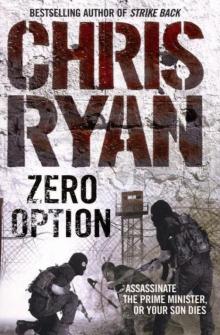 Zero Option gs-2
Zero Option gs-2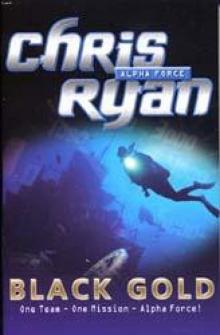 Black Gold
Black Gold Agent 21: Codebreaker: Book 3
Agent 21: Codebreaker: Book 3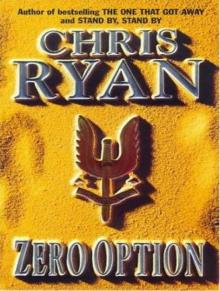 Zero Option
Zero Option Ultimate Weapon
Ultimate Weapon Tenth Man Down
Tenth Man Down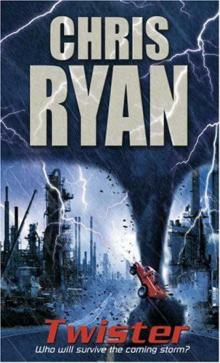 Twister cr-5
Twister cr-5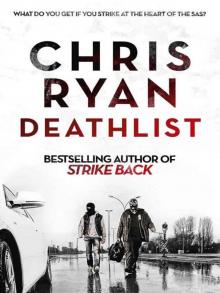 Deathlist
Deathlist Hellfire
Hellfire Flash Flood
Flash Flood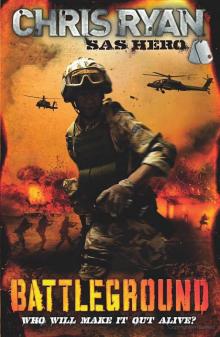 Battleground cr-6
Battleground cr-6 The Increment
The Increment